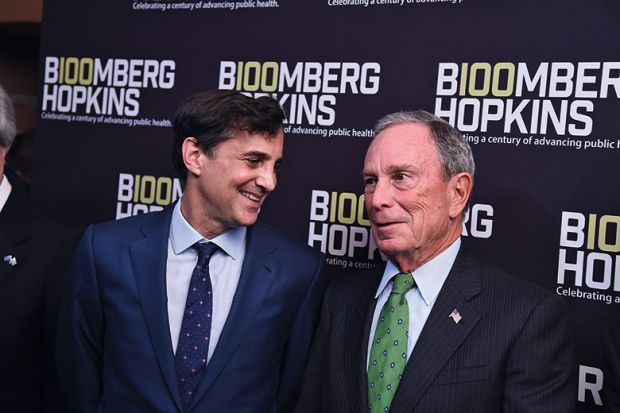The president of Johns Hopkins University has said that criticisms of tycoon Michael Bloomberg’s record $1.8 billion (£1.4 billion) donation to his institution – described as a guarantee that its students can for ever graduate debt-free – “miss the mark”.
Some have suggested that Mr Bloomberg’s philanthropic attack on economic segregation in US higher education could have found far better targets than his own prestigious alma mater.
Ronald Daniels said that concern over the lack of socio-economic diversity on campuses was “legitimate and principled”.
But he added: “Criticism by some that the gift should have been destined for other institutions misses the mark. Mayor Bloomberg’s staggering philanthropy can’t help but raise the sights of donors at other institutions respecting the importance of access to higher education.”
Johns Hopkins, in Baltimore, has a $3 billion endowment; has previously received some $1.5 billion from Mr Bloomberg since 1965; costs about $70,000 a year in tuition fees and expenses; and draws only about 3 per cent of its 6,000 undergraduates from the bottom 20 per cent of American families by income. It takes 24 times as many students from the top 20 per cent.
At the same time, Professor Daniels said that the $1.8 billion gift was only enough to guarantee need-blind admissions at a small institution such as Johns Hopkins, hinting at the immense difficulty facing US higher education, with its current cost structures, if it is to provide a high-quality education to the whole of US society.
Within its elite 35-member group of highly selective, private liberal arts colleges – the Consortium on Financing Higher Education – Johns Hopkins sits at “the very lowest level” of financial aid endowment per student, Professor Daniels said.
“Although we travel in a lofty peer group, we were holding together our financial aid programme with spit and bubble gum,” he said.
The nationwide problem is reflected in figures showing that an estimated 45 million Americans owe a total of $1.5 trillion in student loans. Even Mr Bloomberg’s $1.8 billion infusion would give each of them only a $40 break. Student loan delinquency rates are near their all-time high, with analyses finding that low-income students cannot afford 95 per cent of colleges.
Mr Bloomberg has attracted admiration for the model that his donation to higher education has set for other wealthy philanthropists, as well as concern that he missed an opportunity to have done so much more.
“It is always nice to see rich people donating money for financial aid to support needy students,” said Robert Shireman, a long-time advocate of college affordability who is now a senior fellow at the Century Foundation. “But too often, the givers are not donating in the right places or for the right purpose.”
Sara Goldrick-Rab, professor of higher education policy and sociology at Temple University, agreed. “This gift helps to perpetuate the inequality that Bloomberg claims to protest,” she said. “He has made an investment in a gated institution with an already large endowment.”
Both suggested that a better beneficiary might have been the nearby University of Maryland, Baltimore County, which leads the nation in producing black graduates who later earn a science doctorate.
“That would send the message to all institutions that being in the most elite crowd is not the only route to big donations from people who care about the poor,” Mr Shireman said.
Professor Daniels said that, as president of Johns Hopkins, his first responsibility was to his institution, but he promised that the university was striving to widen participation.
“We know that we have a significant overweight in participation towards students from the highest income quintiles,” Professor Daniels said, adding that Johns Hopkins was “working to substantially change that”.




